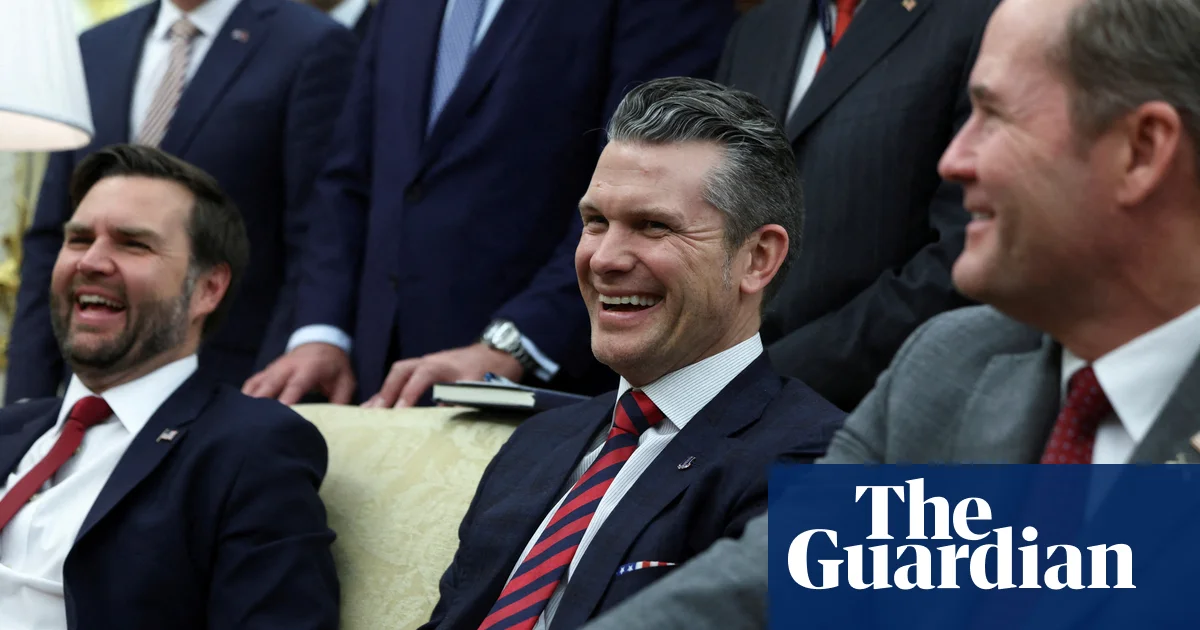If Europe wasn’t already on notice, the extraordinary leak of deliberations by JD Vance and other top-level Trump administration officials over a strike against the Houthis in Yemen was another sign that it has a target on its back.
The administration officials gave Jeffrey Goldberg of the Atlantic a front-row seat to the planning for the strike against the Houthis – a stunning intelligence leak that has caused anger against Republicans who called for criminal investigations against Hillary Clinton and others for playing fast and loose with sensitive information.
On the face of it, the strike against the Houthis had far more to do with the administration’s policies on protecting maritime trade and containing Iran than its concerns about Europe freeloading on US defense spending and military prowess.
But Vance appears determined to push that angle as a reason to postpone the strike.
“I think we are making a mistake,” wrote Vance, adding that while only 3% of US trade goes through the Suez canal, 40% of European trade does. “There is a real risk that the public doesn’t understand this or why it’s necessary,” he added. “The strongest reason to do this is, as [Trump] said, to send a message.”
Vance was contending that once again the United States is doing what Europe should be. It is consistent with his past arguments that the US is overpaying for European security and the derision he displayed toward European allies (almost certainly the UK and France) when he described them as “some random country that hasn’t fought a war in 30 or 40 years”. (Both fought in Afghanistan and the UK fought alongside the US in Iraq).
It was during this policy discussion, Goldberg wrote, that he was convinced that he was reading remarks by the real Vance, as well as defense secretary Pete Hegseth, national security advisor Michael Waltz, and senior Trump advisor Stephen Miller.
Then Vance went a step further. He tacitly admitted a difference between his foreign policy and Trump’s saying that the strike would undermine the president’s Europe policy – one that has been led by Vance in his divisive speech at the Munich Security Conference where he accused European leaders of running from their own electorates and of his Eurosceptic comments on Fox News.
“I am not sure the president is aware how inconsistent this is with his message on Europe right now,” Vance wrote. “There’s a further risk that we see a moderate to severe spike in oil prices. I am willing to support the consensus of the team and keep these concerns to myself. But there is a strong argument for delaying this a month, doing the messaging work on why this matters, seeing where the economy is, etc.”
Those designated on the call also reflect the vice-president’s growing clout in foreign policymaking circles. Vance named Andy Baker, his national security advisor who helped lead the transition team at the Pentagon, as his representative. Hegseth named Dan Caldwell, a leading proponent of “restraint” in the exercise of US foreign power abroad to protect Europe and counter rivals like Russia, indicating the Vance team’s presence at high levels of the Pentagon as well.
At heart, the disagreement indicated that Vance’s views of foreign policy are not quite aligned with Trump. Trump broadly sees the world as transactional and optimists in Europe have claimed he could force a positive outcome by forcing those nations to spend more on defense budgets. But Vance appears far more confrontational and principled in his antipathy toward the transatlantic alliance, and has attacked European leaders for backing values that he says are not aligned with the US.
That makes Vance even more of a concern for Europe. Kaja Kallas, the European foreign policy chief, accused Vance of “trying to pick a fight” with European allies. Another European diplomat said: “He is very dangerous for Europe … maybe the most [dangerous] in the administration.” Another said he was “obsessed” with driving a wedge between Europe and the US.
Back on the chat some sought – carefully – to talk Vance down. Hegseth said the strike would promote “core” American values including freedom of navigation and pre-establish deterrence. But he said the strikes could wait, if desired. Waltz, a foreign policy traditionalist, said: “It will have to be the United States that reopens these shipping lanes.” But he agreed that the administration sought to “compile the cost associated and levy them on the Europeans”.
“If you think we should do it let’s go. I just hate bailing Europe out again,” Vance replied. Hegseth agreed that “I fully share your loathing of European free-loading. It’s PATHETIC.” But, he added, “we are the only ones on the planet (on our side of the ledger) who can do this.”
Miller, the Trump confidant, effectively ended the conversation by saying that the president had been clear. “Green light, but we soon make clear to Egypt and Europe what we expect in return.”
Broadly, the administration’s policies on Europe are coming into focus. And there are few stepping up to voice backing for Nato or for Europe writ large. On a podcast interview this weekend, the senior Trump envoy Steve Witkoff mused about the potential for the Gulf economies to replace those of Europe. “It could be much bigger than Europe. Europe is dysfunctional today,” he said.
Tucker Carlson, the host and another Trump confidant, agreed. “It would be good for the world because Europe is dying,” he said.
